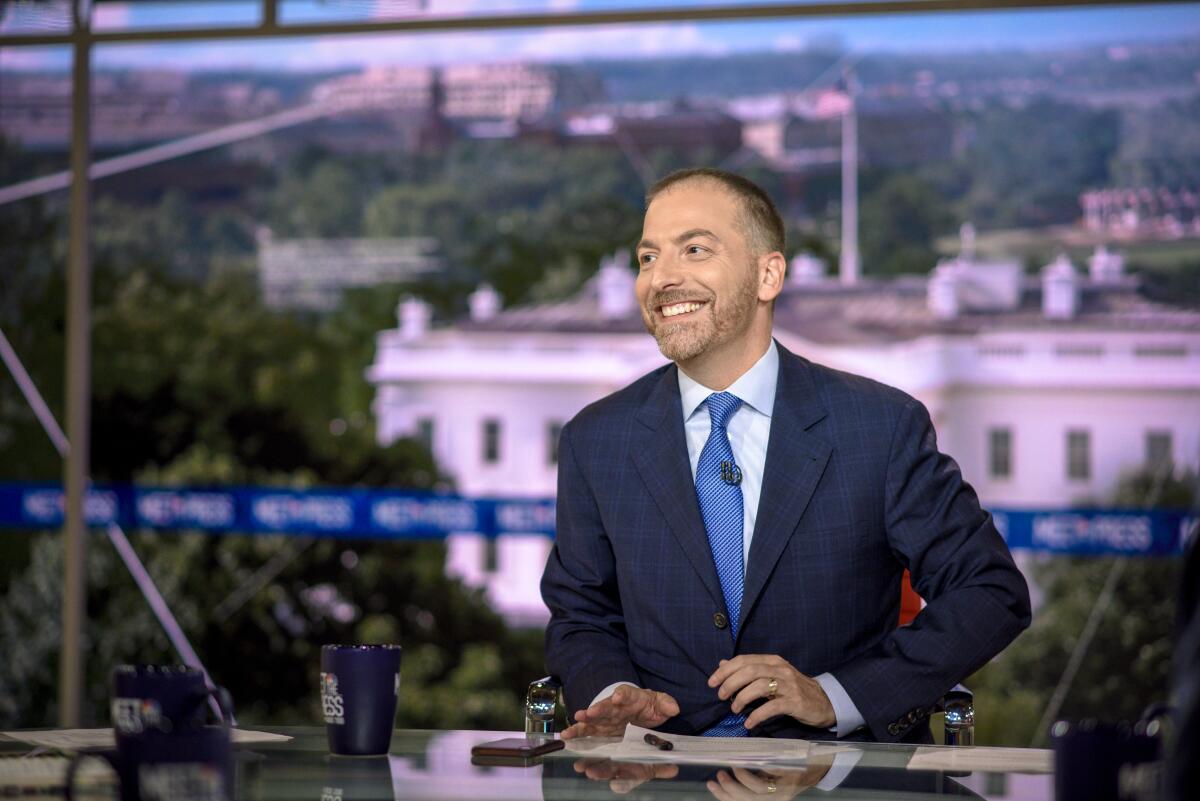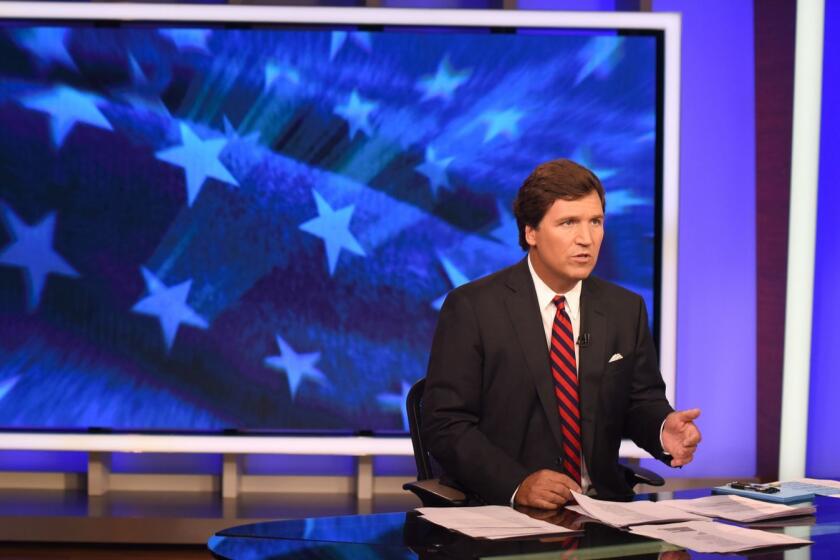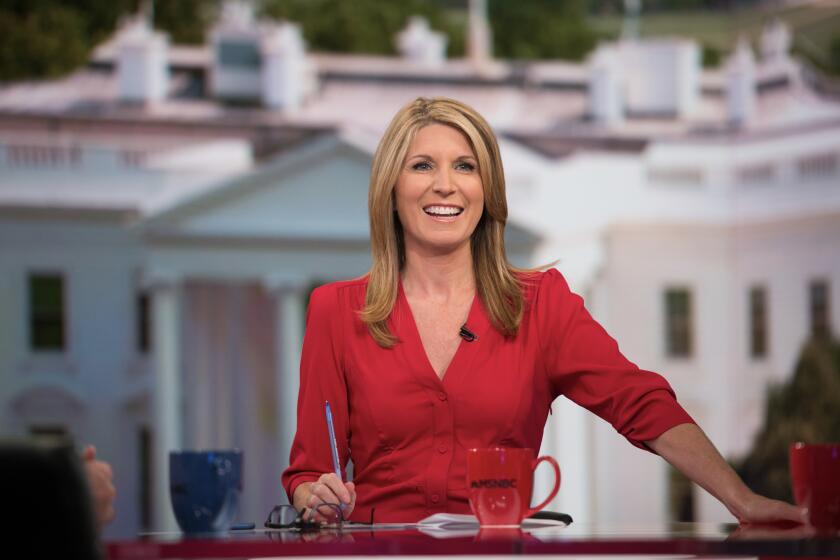‘Meet the Press’ host Chuck Todd is first in viewers — and Twitter critics. Here’s why

When “Meet the Press” moderator Chuck Todd hears that his name is trending on Twitter, he knows it probably isn’t good.
Social media is a harsh real-time critic, even for the NBC Sunday public affairs program that has been a TV news institution since 1947. Increased political polarization — stoked nightly by opinion hosts on cable news — makes the traditionally even-handed and civil approach of “Meet the Press” frustrating for some passionate partisans.
But people are still watching. “Meet the Press” will finish the 2019-20 season as the top-rated Sunday public affairs show for the fourth year in a row, averaging 3.5 million viewers — up 5% from the previous year — according to Nielsen data.
Advertisers distance themselves from “Tucker Carlson Tonight” after the host suggested Kyle Rittenhouse’s alleged actions were a response to law enforcement failure.
Todd, 48, who took over as moderator in 2014 and also serves as political director for NBC News, is expanding the program to NBCUniversal’s new streaming service Peacock with a new weekly series, “Meet the Press: Reports,” starting Sept. 24. The married dad of two also continues to host “MTP Daily” on MSNBC, which recently moved to 1 p.m. Eastern from 5 p.m. to make way for an expanded edition of “Deadline: White House” with rising star Nicolle Wallace.
Todd, who will co-anchor NBC News’ coverage of the presidential debates and election night, recently shared thoughts on his role in the network’s long-running franchise in a Zoom call from the porch of his Arlington, Va., home. The conversation has been lightly edited for length and clarity.
All of the Sunday shows are up in the ratings from a year ago while the rest of broadcast news continues to see its audience erode. Why does the TV ritual of watching Sunday morning programs such as “Meet the Press” still hold up?
I assume somebody who’s watching “Meet the Press” is sitting down with a cup of coffee, with their iPad, with their device, whatever it is. When you are broadcasting news during the week you almost have to say, “Hey, you — preparing for work, pay real attention to this story.” Right? You have to really figure out how to get their attention. That is not something we have to do on Sunday morning. Actually I think the accelerated news cycle has helped the Sunday show. There is a need to figure out what the hell happened this week: “What do I really need to ingest and learn, and what should I ignore?” That is our job — is to tell you what mattered and tell you what didn’t.
You are No. 1 again this season. But when you go on social media, it can get very rough. I don’t see the other Sunday hosts getting the kind of heat that you do.
I take it as a compliment. I think it’s “Meet the Press” — I like the fact that people hold us to the highest of standards in their minds. They believe in many ways that we should be the arbiters of everything. The arbiters of making people say what they’re not saying — whatever it is. So I do think it comes from a place of good. But obviously, social media is what it is. I got off for a bit about a year ago. I certainly don’t think it’s been good for politics. I think it’s not good for governing. It does seem to essentially legitimize character-assassinating and bullying in ways that are not useful to the body politic. So I will say this: By getting off for a bit, I don’t have anxiety anymore. And I hope that journalists don’t let Twitter become their editor. I do worry there are people that cater more to the social media crowd than to the reality of the situation. And I don’t want to ever be caught in that trap.
People seem to go after you a lot because they think you’re not pushing back enough on false information spouted by your guests. Are interview subjects flooding you with misinformation more relentlessly because they think there’s a better chance that they can get away with it?
You can’t correct everything. You have to pick and choose your spots. You pick and choose what you go after. You can sit there and go down those rabbit holes of accountability interviews on generic political rhetoric, and you’ll have wasted 10 minutes. At the end of the day I believe my job is to surface as much information as the viewer needs. I also am a believer in light not heat. I’m not shy. I will go toe-to-toe with anybody. Certain people’s feelings have been hurt to this day about it, and they don’t want to come on and defend themselves anymore. There’s a handful of senators that are in that column.
The former Bush White House communications director will see her daytime show “Dateline: White House” expand to two hours daily.
Is it harder to take a neutral approach today?
I understand the era we’re in — there are a lot of people that Trump makes very anxious. Trust me, I get it. I have the death threats to prove it. But there is no utility in lecturing somebody on air. You get to be Howard Beale once, you know? There are places where that’s perfectly appropriate. This is where I’m concerned that we’ve conflated news and opinion too much. For an opinion host, there’s a lot of expectation for how declarative they can be or say.
You say you have a list of “gas-lighters” you won’t book as guests on “Meet the Press”?
I wouldn’t call it a “list.” But it’s people that have been on and they’ve proven to be truly gas-lighters, and you don’t put them on again. That’s to me how you solve this problem at a lot of media outlets.
The Trump administration has been jet fuel for the cable news business. And I’m wondering what it will be like if he’s no longer president on Jan. 20.
I think you and a lot of people want to know that.
Well, are there discussions about that how affects MSNBC, which is having its best year ever?
I’m sure there have been discussions. Trump has been a challenge to the news business in general. We’re going through a larger transformative process in the media. Where’s cable news going to be in five years compared to streaming as the audience moves? Are we going to get more siloed? Is media going to get even more niche? Part of me wonders are we going to go electronically to where we were in the 19th century in print media? Remember, every major city in the 19th century had a newspaper for the Democrats, a newspaper for the Republicans, a newspaper for the Federalists. Frankly, this is why I’m wanting to move closer to the world of streaming. I’m making a bet that there’s going to be an audience that rejects the polarization a little bit and rejects that form of sort of constant advocacy. This is why I’m fired up about Peacock, where I think “Meet the Press” will thrive.
What will you do on your new Peacock series “Meet the Press: Reports” that you can’t do every Sunday?
I was able to do a special show two Sundays ago on voting. Week to week I’m not always able to do that. Well, now on Peacock I can. I view it sort of as our opportunity basically to do weekly documentaries. It’s going to be single-issue. You don’t have to watch it the day that it’s out. It may be relevant to you a couple weeks later. It’s more driven by the analytical and the informational, which is where I’m much more comfortable.
Your MSNBC program “MTP Daily” moved from a late afternoon time period to midday, where there are fewer viewers available to watch. What was the rationale given to you for doing this?
Opinion versus news. I mean, it’s pretty clear. I was in a different neighborhood [at 5 p.m.]. I was doing a news analysis show, and there was a little more of a stronger opinion vibe [on the shows] before and after. Look, it makes more sense to be in the news hole of MSNBC, particularly from 10 a.m. to 2 p.m., of myself, Hallie Jackson, Andrea Mitchell and Craig Melvin. [There] has always been this tricky line about news and opinion [on MSNBC]. This creates a brighter line, and I get it. And it makes a lot more sense for “MTP Daily.”
There was recently a published report that Jeff Shell, the chief executive of NBCUniversal, floated the idea of having Nicolle Wallace take over as moderator of “Meet the Press.” Did that bother you?
It would’ve if it were true. I have no reason to believe it. It didn’t make sense to me. I’m not worried. But I also know I’m not here forever. The program doesn’t belong to me. That is something that I’m fully aware of. I’m a custodian. My job is to put “Meet the Press” in a better place and leave it in a better place than I got it. And if I got hit by a bus tomorrow, I’d be really proud of my stint at “Meet the Press.”
On a more superficial note, there has been a facial hair change. When did you go from goatee to full beard?
I did it in the summer of 2019. It was the day of [former special counsel] Robert Mueller’s testimony. And I thought, “You know what, I’ll wear it for that, I’ll see what the reaction is.” And [former NBC News chairman] Andy Lack sends me a note. He is Mr. Anti-Facial Hair. He always was. He goes, “Good God, everybody loves your damn beard. I guess you have to keep it,” or something like that. So I got permission. But this was the beard my dad had. And so it’s kind of nice to be wearing my dad’s beard.
You went to college on a music scholarship. Have you taken out your French horn lately?
I actually did the other day because I was listening to all shuffle on the music I own. And a whole bunch of French horn solos popped up one day on my Apple algorithm.
What’s your go-to piece?
Well, to find out what kind of shape my lips are in, it’s usually one of the Mozart horn concertos. Mozart wrote these four horn concertos that you end up living and breathing if you’re a French horn player, even if you don’t like them. They just — they pop into your life all the time. But I happen to like them, thankfully. It’s usually the second one — it at least tells me what kind of strength I have in my embouchure.
More to Read
Inside the business of entertainment
The Wide Shot brings you news, analysis and insights on everything from streaming wars to production — and what it all means for the future.
You may occasionally receive promotional content from the Los Angeles Times.













